

Good Practice Study on Principles for Indicator Development, Selection, and Use in Climate Change Adaptation Monitoring and Evaluation. The Independent Evaluation Office of the Global Environment Facility (GEF IEO) has undertaken - on behalf of the Climate-Eval community of practice - a Good Practice Study on Indicator Development, Selection and Use Principles for Climate Change Adaptation M&E.
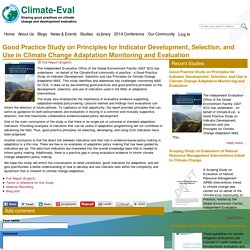
This study identifies and addresses key challenges concerning M&E for CCA. It does so by documenting good practices and good practice principles on the development, selection, and use of indicators used in the M&E of adaptation interventions. The study also emphasizes the importance of evaluative evidence supporting adaptation-related policymaking. Lessons learned and findings from evaluations can inform the direction of future policies. To capitalize on that opportunity, the report provides principles that can serve as guidance for both policymakers and evaluators in moving in a common and mutually supportive direction; one that maximizes collaborative evidence-based policy development.
Climate Change & Food Security Vulnerability Assessment. Toolkit for assessing community-level potential for adaptation to climate change. This CCAFS Working Paper presents a participatory methodology that has been designed to provide organizations with the tools to understand the interrelations between climate impacts, food systems and livelihood strategies at the local level, while taking into consideration traditional /indigenous knowledge of the participating community.
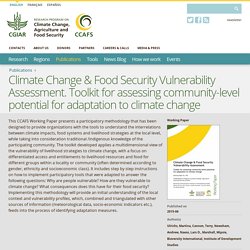
The toolkit developed applies a multidimensional view of the vulnerability of livelihood strategies to climate change, with a focus on differentiated access and entitlements to livelihood resources and food for different groups within a locality or community (often determined according to gender, ethnicity and socioeconomic class). It includes step by step instructions on how to implement participatory tools that were adapted to answer the following questions: Why are people vulnerable? How are they vulnerable to climate change? What consequences does this have for their food security? TURAS - Urban Resilience and Sustainability. Skript_375.pdf. Monitoring and Evaluation of Climate Change Adaptation. Monitoring and Evaluation of Climate Change Adaptation. WeADAPT 4.0. Quantitative risk assessment of the effects of climate change on selected causes of death, 2030s and 2050s.
Microsoft Word - Seminaariohjelma_27_03_2014.docx - seminaariohjelma_27_03_2014.pdf. Skripten 375 (2014) - Skript_375.pdf. Suomen ympäristöopisto SYKLI: Log in to the site. Course: Economics of Climate Resilient Development. ECRD101. Publications : The Vulnerability Sourcebook: Concept and guidelines for standardised vulnerability assessments. Publications Fritzsche, Kerstin; Stefan Schneiderbauer, Philip Bubeck, Stefan Kienberger, Mareike Buth, Marc Zebisch, and Walter Kahlenborn 2014: The Vulnerability Sourcebook: Concept and guidelines for standardised vulnerability assessments.
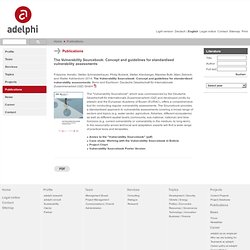
Bonn and Eschborn: Deutsche Gesellschaft für Internationale Zusammenarbeit (GIZ) GmbH The "Vulnerability Sourcebook", which was commissioned by the Deutsche Gesellschaft für Internationale Zusammenarbeit (GIZ) and developed jointly by adelphi and the European Academy of Bozen (EURAC), offers a comprehensive tool for conducting regular vulnerability assessments. The Sourcebook provides a standardised approach to vulnerability assessments covering a broad range of sectors and topics (e.g. water sector, agriculture, fisheries, different ecosystems) as well as different spatial levels (community, sub-national, national) and time horizons (e.g. current vulnerability or vulnerability in the medium- to long-term). Uncertainty guidance - climate-adapt. From Assessment to Implementation: Approaches for Adaptation Options Analysis.
RESOURCES. Criteria for Ecosystem-Smart Disaster Risk Reduction. Introduction The integration of ecosystems and natural resource management in disaster risk reduction (DRR) has been largely overlooked to date.
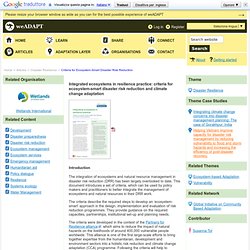
This document introduces a set of criteria, which can be used by policy makers and practitioners to better integrate the management of ecosystems and natural resources in their DRR work. The criteria describe the required steps to develop an ‘ecosystem-smart’ approach in the design, implementation and evaluation of risk reduction programmes. They provide guidance on the required capacities, partnerships, institutional set-up and planning needs. The criteria were developed in the context of the Partners for Resilience alliance, which aims to reduce the impact of natural hazards on the livelihoods of around 400,000 vulnerable people worldwide. Key messages. New approaches to promoting flexible and forward looking decision making. Executive Summary Policy-makers are often tasked with making difficult decisions in the face of an uncertain future outlook.
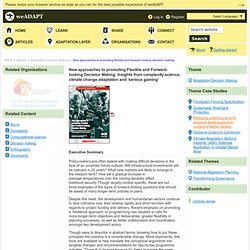
Will infrastructural investments still be relevant in 25 years? What new markets are likely to emerge in the medium term? How will a gradual increase in average temperatures over the coming decades affect livelihood security Though largely context specific, these are but three examples of the types of forward-looking questions that should be asked of many longer-term policies or plans. Evaluation Review 2: International and donor agency portfolio evaluations: Trends in monitoring and evaluation of climate change adaptation programmes.
The Adaptation Knowledge Day V Presentations - Global Adaptation Network (GAN) "Climate Change Adaptation Gaps” Presentations 13:30 – 13.45 UNEP and the Adaptation Committee UNEP - Merlyn van Voore Adaptation Committee: Klaus Radunsky and Fred Kossam Presentations Klaus Radunsky and Fred KossamSaleemul Huq - Adaptation Committee Presentation 13:45 – 15.00 Session 1: Knowledge Gaps.
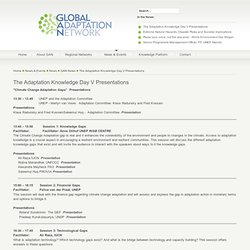
The Adaptation Knowledge Day V Presentations - Global Adaptation Network (GAN) Supporting LDCs to advance National Adaptation Plans (NAPs) UNDP-ALM - UNDP's Adaptation Learning Mechanism. The UNDP-Adaptation Learning Mechanism (undp-alm.org) is UNDP's knowledge-sharing platform on country led programmes and projects financed by the Least Developed Country Fund (LDCF), Special Climate Change Fund (SCCF), Adaptation Fund (AF), bi-lateral donors and through decentralized cooperation supported by UNDP’s Down to Earth: Territorial Approach to Climate Change (TACC) project.
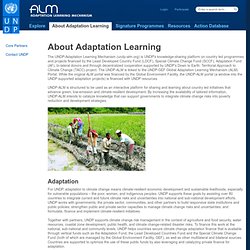
The UNDP-ALM is linked to the UNDP-GEF Global Adaptation Learning Mechanism (ALM) Portal. While the original ALM portal was financed by the Global Environment Facility, the UNDP-ALM portal (a window into the UNDP supported adaptation projects) is financed with UNDP resources. The indirect effects of adaptation: Pathways for vulnerability redistribution in the Colombian coffee sector. Professionals and Climate Change_0.pdf. Guest blog: Costs to bear - poverty reduction and climate change resilience. This blog reflects the authors' opinion.
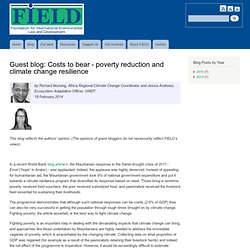
(The opinions of guest bloggers do not necessarily reflect FIELD’s views). In a recent World Bank blog article External Links icon , the Mauritanian response to the Sahel drought crisis of 2011 - Emel (“hope” in Arabic) - was applauded. Indeed, the applause was highly deserved. The programme demonstrates that although such national responses can be costly (2.6% of GDP) they can also be very successful in getting the population through tough times brought on by climate change. Fighting poverty is an important step in dealing with the devastating impacts that climate change can bring, and approaches like those undertaken by Mauritanians are highly needed to address the immediate vagaries of poverty, which is exacerbated by the changing climate. 10651IIED: Reconfiguring Urban Adaptation Finance. There is an urgent need to review and improve the means for funding adaptation to climate change in urban areas.
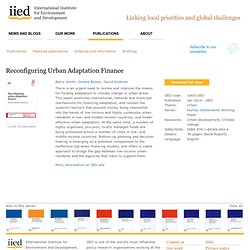
This paper examines international, national and municipal mechanisms for financing adaptation, and reveals the systemic barriers that prevent money being channelled into the hands of low-income and highly vulnerable urban residents in low- and middle-income countries, and hinder effective urban adaptation. At the same time, a number of highly organised, pro-poor, locally managed funds are being pioneered across a number of cities in low- and middle-income countries. Bottom-up planning and decision-making is emerging as a potential complement to the ineffective top-down financing models, and offers a viable approach to bridge the gap between low-income urban residents and the agencies that claim to support them. WeADAPT 4.0.
World Bank Launches City Climate Accreditation Program. January 2014: The World Bank's Urban Development and Resilience Unit has launched a certification program for personnel working on city greenhouse gas (GHG) inventories, low-carbon planning and climate risk assessment.
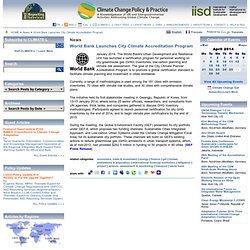
The goal of the City Climate Planner Accreditation Program is to promote a global certification standard to facilitate climate planning and investment in cities worldwide. Currently, a range of methodologies is used among the 181 cities with emission inventories, 70 cities with climate risk studies, and 30 cities with comprehensive climate plans. The initiative held its first stakeholder meeting in Gwangju, Republic of Korea, from 13-15 January 2014, where some 25 senior officials, researchers, and consultants from UN agencies, think tanks, and companies gathered to discuss GHG inventory methodologies.
Participants agreed to launch personnel certification for city GHG inventories by the end of 2014, and to begin climate plan certifications by the end of 2015. GAC_ClimateChange_AdaptationSeizingChallenge_Report_2014. Klimawandel und Gesundheit: Ein Instrument zur Abschätzung der gesundheitlichen Kosten und der Anpassungskosten. 2013, viii + 46 Seiten ISBN 978 92 890 0023 9 KostenlosDiese Publikation ist nur online erhältlich. Das WHO-Regionalbüro für Europa hat einen Algorithmus zur ökonomischen Analyse aufgestellt, um angesichts des Klimawandels die Planung des Gesundheitsschutzes in den Mitgliedstaaten der Europäischen Region zu erleichtern.
Die Formel entspricht dem Stand der Wissenschaft und führt Schritt für Schritt zur Abschätzung: a) der durch den Klimawandel verursachten Kosten in Form gesundheitlicher Schäden, b) der in mehreren Sektoren verursachten Anpassungskosten des Gesundheitsschutzes vor diesen Schäden und c) der Wirtschaftlichkeit derartiger Anpassungsmaßnahmen: Kosten der Anpassung im Verhältnis zu ihrem Nutzen bzw. den abgewendeten Gesundheitskosten.
Der Algorithmus soll in erster Linie die Ministerien der Mitgliedstaaten unterstützen, die für die Anpassung an den Klimawandel zuständig sind. Klimawandel und Gesundheit: Ein Instrument zur Abschätzung der gesundheitlichen Kosten und der Anpassungskosten. Research Priorities on Vulnerability, Impacts and Adaptation: Responding to the Climate Change Challenge. The Edible City. WISE-UP to Climate: New project on water and climate adaptation. 25 September 2013 | News story. 06.09.2013: Väitös systeemi- ja operaatiotutkimuksen alalta, DI Tommi Ekholm - Aalto-yliopisto. Sijainti: Sali M1, Otakaari 1, 02150, Espoo, FI 60° 11.160 N 24° 49.650 E Diplomi-insinööri Tommi Ekholm väittelee perjantaina 6.9.2013 klo 12 Aalto-yliopiston perustieteiden korkeakoulussa, salissa M1, Otakaari 1, Espoo.
Väitöskirjassa ”Risks, costs and equity. 2012 09 RA Adaptation or Manipulation - Unpacking climate change response strategies.pdf (application/pdf-tiedosto) Book Launch: Field Guide To Community Based Adaptation - CSDi Blog - CSDi. Go to bottom of this page to learn how to search electronically within the book. 'Tim Magee, and his colleagues at CSDi, are to be commended for producing a book which should change the way development is practiced, and so directly contribute to the improvement of millions of lives around the world.' – Howard White, Executive Director, 3ie, USA 'A fascinating and informative guide to a subject of growing international importance. Tim Magee skillfully explains ways to combine external expertise and local perspectives on adaptation to climate change.
This useful book should be read by development practitioners as well as students of climate change policy and international development.' – Tim Forsyth, London School of Economics and Political Science, UK 'This is a most-awaited book for development practitioners who are increasingly confronted with the challenge of addressing climate risks in designing and implementing programmes and projects. Amazon.com Field Guide page. Routledge eBook. Climate change and Ecosystem-based Adaptation- a new pragmatic approach to buffering climate change impacts. PROVIA_Draft_Guidance_on_Assessing_VIA-For_Review.pdf (application/pdf-tiedosto) (application/pdf-tiedosto) 3_2010_paakaupunkiseudun_ilmasto_muuttuu.pdf (application/pdf-tiedosto)
GRaBS_AssessmentTool_UserGuidance.pdf (application/pdf-tiedosto) Home - climate-adapt. Adaptation. Joto Afrika - November's Issue highlights "Gender and Community-Based Adaptation in Africa" and features CARE's work - English / French Case Studies from the Africa Climate Change Resilience Alliance (ACCRA) phase 1 evaluation Executive Summary: Independent Evaluation of the Africa Climate Change Resilience Alliance Phase 1 Strategies for influence:Capacity building and district planning Secondment to a Government Ministry Reaching out to government and civil society in Uganda Disaster Risk Profiling in Ethiopia Exchange visits: Ethiopia, Mozambique and Uganda ACCRA Synthesis Report: Understanding adaptive capacity at the local level in Mozambique.
CARE_PMERL_Manual_2012.pdf (application/pdf-tiedosto) Rio_20_adaptation_brochure.pdf (application/pdf-tiedosto) IWA - Adapting urban water systems to climate change. ICLEI, UNESCO-IHE and IWA have authored, as part of the ‘SWITCH – Managing Water for the City of the Future’ project, a handbook on adapting urban water systems to climate change. The handbook aims to fill a gap in the adaptation field: while a lot of information is available about various adaptation topics, there is a lack of guidance for decision makers at the local level working on urban water who wish to proactively prepare for and adapt to climate change. The handbook first examines some of the key areas of vulnerability to climate change within urban water systems. Urban water systems can be affected by most of the predicted climatic changes; for example, droughts can affect water supply directly and indirectly (when vegetation regrowth after wildfires reduces catchment yields), higher temperatures can lead to the deterioration of wastewater pipes and increased heavy rainfall can cause combined sewer overflows.
Download the handbook here . Contents 1. ELAN. Adaptation Knowledge Day I.